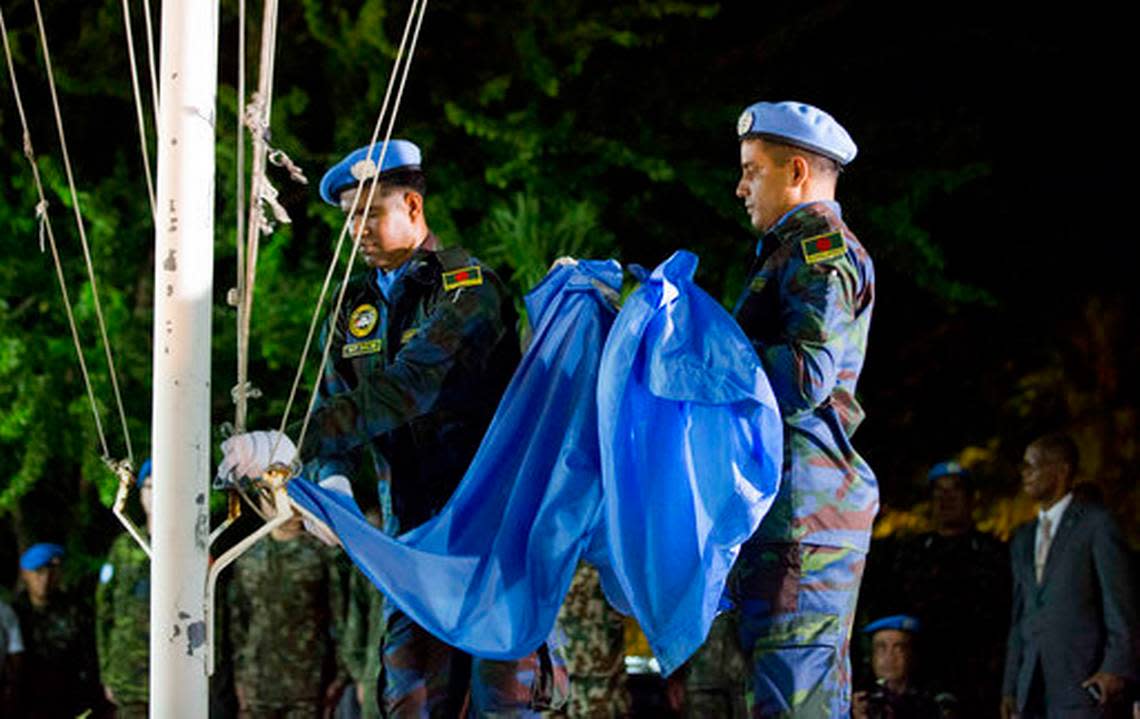Haiti needs new U.N. peace-keeping mission, after Trump’s terrible decision to kill it | Opinion

- Oops!Something went wrong.Please try again later.
- Oops!Something went wrong.Please try again later.
There’s one thing President Biden could do immediately to stop the chaos in Haiti, which threatens to result in more violence and a possible refugee crisis: reverse former President Trump’s disastrous 2017 decision to cut funding for the United Nations’ peace-keeping forces in that country.
Granted, there have been five United Nations missions in Haiti over the past 30 years, and none of them was able to help the country get back on its feet.
But there is a growing sense in the international diplomatic community — especially after the shocking July 7 assassination of President Jovenel Moïse — that Haiti is currently ungovernable, and that only a U.N. peace-keeping mission or a consortium of friendly nations can supervise a fair election and help a new government take office.
Dominican Republic Foreign Minister Roberto Alvarez, whose country shares the Hispaniola island with Haiti and is affected more than most other nations by the Haitian crisis, told me in a telephone interview Friday that “a robust international presence in Haiti is needed.”
Alvarez said that “there is a real danger of a ‘Somalization’ in Haiti that could affect the peace and security of the whole region.” He was referring to the period of mayhem, tribal wars, state failure and migration crisis that tore apart Somalia in the 1980s and 1990s.
“In Haiti, the gangs have grown impressively in size and in the power of their weaponry, and are increasingly acquiring a very important territorial power in Port-au-Prince,” Alvarez told me. “These gangs are reaching a level of political autonomy like we’ve never seen before.”
As I’m writing these lines, there is confusion over who is governing in Haiti. Interim Prime Minister Claude Joseph was supposed to step down only days after Moise’s assassination. Before his death, Moise had appointed a new prime minister, Ariel Henry, to take over, but he had not yet been sworn in. Both men now claim to be Haiti’s legitimate prime ministers, and there is no functioning parliament.
Alvarez, the Dominican Republic’s foreign minister, declined to elaborate on whether the United Nations or a consortium of nations should be in charge of a new international mission to Haiti. He said any such mission could only go at the invitation of the Haitian government.
Many diplomats who have served in Haiti tell me that only the United Nations has the experience in the field to be able to calm Haiti and help create a functioning democracy.
Edmond Mulet, a Guatemalan diplomat who twice led the United Nations’ MINUSTAH peacekeeping forces in Haiti, in 2006 and again in 2010, told me that what’s needed now is a major expansion of the skeleton U.N. security crew that was left in Haiti after Trump cut funding for the estimated 9,000 MINUSTAH troops and effectively dissolved that peace-keeping mission in 2017.
“Trump’s decision was a big mistake,” Mulet told me. “It was a premature withdrawal, because the dissuasive presence of U.N. peace-keeping troops in Haiti is very important.”
Asked why many Haitians are critical of previous U.N. peace-keeping missions in Haiti, Mulet said that the U.N. peace-keepers never had a real chance to do their job because, among other things, they were always withdrawn prematurely and never had a strong mandate.
During his stints as MINUSTAH chief in Haiti, Mulet was not allowed to carry out security operations without coordination with Haiti’s National Police, some of whose officers were in cahoots with the gangs, he said. Many U.N. security operations failed because the gang leaders were tipped off in advance, he added.
“What’s needed in Haiti is a long-term mission of between 15 to 20 years, with an executive mandate,” Mulet told me.
Other veteran Haiti watchers like George A. Fauriol, of the Washington, D.C.-based Center for Strategic and International Studies, support the idea of a shorter-term U.N. mission.
“The U.N. could play a role in a limited engagement related to elections and the period immediately after the elections,” Fauriol told me. “That sounds plausible, and maybe even necessary.”
Indeed, to prevent a cycle of violence and a new refugee crisis that could affect much of the region, Biden should push for a new U.N. peace-keeping mission with expanded powers. Trump goofed badly on Haiti, and Biden should urgently repair the damage.
----
Don’t miss the “Oppenheimer Presenta” TV show on Sundays at 8 p.m. E.T. on CNN en Español. Twitter: @oppenheimera

